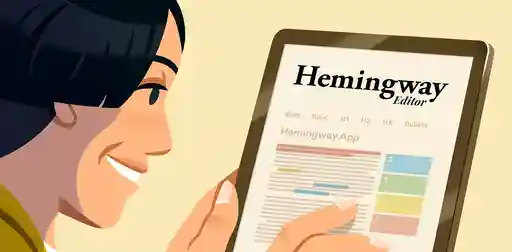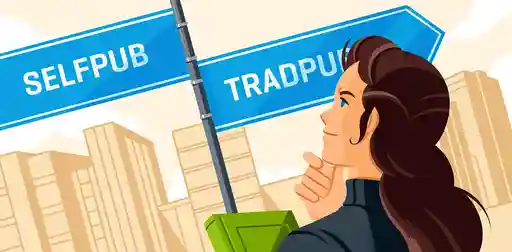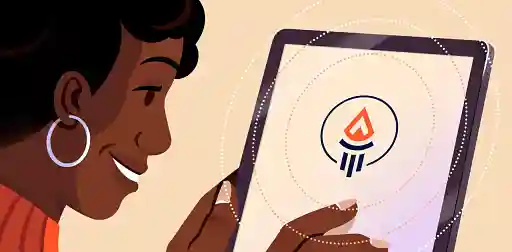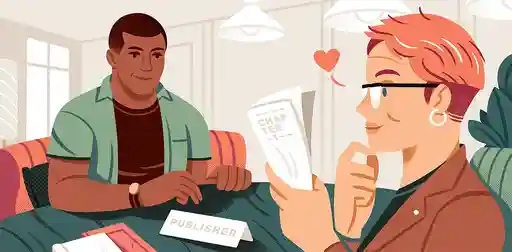Blog • Understanding Publishing
Last updated on Oct 15, 2025
Book Publishers to Avoid: 5 Types of Shady Companies
Loretta Bushell
Loretta is a writer at Reedsy who covers all things craft and publishing. A German-to-English translator, she specializes in content about literary translation and making a living as a freelancer.
View profile →Becoming a published author is a dream shared by almost every writer. Unfortunately, there are plenty of unreliable companies out there looking to make a quick buck by exploiting those dreams — from notorious pay-to-publish vanity presses like Author Solutions to brand-new fake writing contests.
Many companies will try to overcharge for their service, use high pressure sales tactics, and make vague, unverifiable claims about their success. To avoid falling prey to publishing scams, you should learn about their methods and warning signs, and treat every unsolicited message with extreme caution.
There are five major types of publishing companies to avoid (though many companies fall across multiple categories):
|
❌ Type of publishing company to avoid |
🚩 How they scam authors |
⚠️ Examples |
|
Vanity presses |
Vanity presses charge authors thousands of dollars for publishing services, then release them with little to no editing or marketing, as they profit from author fees rather than book sales. |
Author Solutions, Page Publishing |
|
Big Five impersonators |
Big Five impersonators use names, email addresses, and branding that closely mimic legitimate “Big Five” publishing houses (e.g., Penguin Random House) to trick authors into paying fees that the real publishers would never charge. |
Penguin Authors House, PenguinPublishers.com |
|
Companies charging for free services |
These companies charge authors hefty fees for services such as ISBN registration and copyright filing — which authors can actually do themselves for little to no cost. |
Publisher Services, LT-Writing.com |
|
“Guaranteed bestseller” phonies |
These companies guarantee to make you a “bestseller” for “only” a thousand dollars or so — but don’t promise any actual sales or fans. Instead, they game the system to get meaningless results. |
Leavitt Peak Press, Next Phaze Media Group |
|
Fake writing contests |
Scammy writing contests make authors pay for the privilege of winning, and often have as many winners as possible. |
IACP Cookbook Awards, Global Ebook Awards |
Let’s look at each of these types in more detail, exploring examples of known scams and tips for identifying new ones.
1. Vanity presses
Who doesn’t fantasize about securing a publishing deal and seeing their book in print? Having to pay some fees to get the ball rolling may seem like a small sacrifice to make.
But that would be a big mistake. No legitimate traditional publisher would ask you to foot the bill. In fact, when acquiring your book, they will pay you an advance. To understand why publishing with a vanity press is a terrible idea, head on over to this post, which discusses the dangers of “paying to publish.” In short: the publisher profits whether or not your book sells, so why would they spend time and money giving it the best chance of success?
Don’t confuse “publishing services” with “editing and design services.” The former are always a scam, whereas the latter are things you do need on your self-publishing journey — but only from reputable sources. Make sure you do some research before signing a contract with an editor or designer. Or, search for professionals on Reedsy, all of whom meet our rigorous selection criteria.
Some prolific vanity presses you may wish to avoid include:
- Page Publishing
- Xlibris
- Author Solutions
- iUniverse
- Austin Macauley Publishers
- Inprint Publishing
- Author Choices
- Pegasus Elliot Mackenzie
- Olympia Publishers
- Morgan James Publishing
- Page Publishing
- Christian Faith Publishing
- Newman Springs Publishing
Sadly, it isn’t enough to simply learn the names of unreliable publishers. New vanity presses seem to set up shop each month — and with no “bad press” associated with their names, they’re able to convince many authors to pay for their services.
“Hybrid publishers”
Be particularly wary of vanity presses masquerading as “hybrid publishers.” True hybrid publishers charge authors for publishing services but also profit from book sales, meaning they’re not quite as scammy as vanity presses (though we’d still choose self-publishing any day).
Austin Macauley Publishers, Pegasus Elliot Mackenzie, Christian Faith Publishing, and even Page Publishing all claim to be hybrid or “partnership” publishers, but don’t be fooled: they’re actually vanity presses through and through.
If you’re unsure about whether a publishing company is a vanity press or not, here are some red flags to look out for:
Q: What are the key red flags authors should look out for when approached by a vanity press?
Suggested answer
Spotting the red flags when dealing with a vanity press can save you a lot of headaches (and money!). Here are some key things to watch for:
- Upfront Fees: If they’re asking you to shell out big bucks to publish your work, it’s a major red flag. Legitimate publishers make money from selling books, not charging authors.
- Unrealistic Promises: Claims like “guaranteed bestseller” or “we’ll get you into every bookstore!” are major eye-roll territory. No one can promise that, and reputable publishers won’t even try.
- Accepting Anything: A real publisher is picky—they have to be since they invest in what they publish. If a press will take your book with zero hesitation (and no editing), chances are it’s more about your money than your talent.
- Vague Contracts or none at all: If the contract feels murky, confusing, or doesn’t make it clear what you’re getting and what rights you retain, that’s a huge red flag. Always know what you’re signing!
- Hidden Costs: Watch for surprise fees for “marketing,” “editing,” or “special services.” It’s a tactic used to squeeze more out of you once you’re already on the hook.
- Pushy Sales Tactics: If they’re coming at you hard with “limited-time offers” or pressuring you to sign fast, it’s a no-go. Legit publishers won’t need to convince you that hard.
- Shady Reputation: Do a quick online search. If you see lots of unhappy authors and stories of people feeling scammed, run the other way.
- Limited Distribution Claims: Be wary if their “distribution network” is mostly online listings without meaningful reach or promotion. Real publishers have genuine connections in the industry and established distribution channels.
- No Editing or Quality Control: If there’s no real editorial process or constructive input, it indicates they don’t care about the quality of your work—just about getting paid.
Bottom line is if it feels off or you’re seeing a bunch of these warning signs, trust your gut and dig deeper. Your work deserves better!
Eilidh is available to hire on Reedsy ⏺
I think we need to first distinguish between vanity presses and hybrid/independent publishers. There are legitimate publishers with a business model that includes an upfront payment from authors. This payment funds the production of the book, and then includes a royalty split in favor of the author, such as 70/30 or even 80/20.
Those are hybrid presses, which help keep much of the decision-making surrounding the book in the author's hands and provide a means for authors to benefit the most if the book sells well. They don't accept every book they are pitched, have quality standards that rival traditional publishers, and make money when more books are sold.
The hybrid model is different from a vanity press, which earns the bulk of its money from the pre-production and printing costs. Vanity presses rarely turn any author down who can pay for its services. Printing and design quality varies but you can still get a good-looking book from a vanity press, it will just be very expensive.
To know if you're dealing with a vanity press or a hybrid/independent press look for:
- Writers guidelines. Do they have any guidelines or will they publish anything?
- A sense of urgency. Vanity presses want to get you to commit and pay them money. This may lead to frequent emails, texts, and phone calls to inquire about the hold-up.
- Distribution details. Once your book is printed, how will the publisher get it into bookstores and, ultimately, readers? They should have a distribution partner, such as Simon & Schuster.
In addition to vanity presses, there are many, many scam operations that have cropped up offering to ghostwrite and publish your book for a couple thousand dollars. Be aware that you will likely get nothing, or next to nothing. Avoid these at all costs.
Scammers may have a legit-sounding company name but will lack any information about the founders and the team members who will be doing the work. They will feature gorgeous cover photos of books they never had anything do with producing, but which look impressive. They will feature "testimonials" and A+ Better Business Bureau (BBB) and TrustPilot ratings that are fake - type in the BBB and TrustPilot URLs yourself to check for the real reviews. And they, too, will hound you to sign on the dotted line and send them money.
If the deal being offered sounds too good to be true, it very likely is. Protect yourself.
But the reality is that few first-time authors will qualify for a traditional publishing deal that doesn't involve paying for production. This is because the Big 5 publishers are risk averse and want book deals from people who have huge platforms and social media follower counts. That is, they want to be almost assured that your book will be a bestseller, and few authors can guarantee that. Which is why hybrid publishing is a terrific alternative.
Marcia is available to hire on Reedsy ⏺
Unrealistic expectations. All vanity publishers can do is produce the physical book and get it onto sites like Amazon. They cannot guarantee any income from sales.
Andrew is available to hire on Reedsy ⏺
The easiest way to distinguish a scam publisher from a reputable hybrid publisher or self-publisher is PRICE. If a publishing firm quotes a fee of just a few thousand dollars for a service package that includes everything from copy editing, cover design, and layout to marketing and publicity—or even ghostwriting and developmental editing—you’re probably dealing with scammers. I know this from experience and from the fact that any single one of those services, when delivered by skilled and experienced professionals, usually costs more than a few thousand dollars. By contrast, the fees charged by the reputable hybrid publishers I know—companies with a track record of obtaining meaningful results for their authors—start in the $15,000 range. Several of my past clients made the mistake of opting for cut-rate vanity presses, and all of them came to regret it. When you hire a publisher that charges cut rates, you get cut-rate services in return.
Peter is available to hire on Reedsy ⏺
The fact that they're a vanity press is the only red flag you need. 😉 Seriously, though, I'd aim for either traditional publishing or full-on self-publishing. These companies who want you to go in on the costs are generally more trouble than they're worth. Caveat emptor.
Brett is available to hire on Reedsy ⏺
It's simple. If a "publisher" approaches you about "publishing" your work, and doesn't offer to write you a check, run away. Okay, that's a bit dramatic. But understand that a true publisher buys intellectual property from creators, Some authors choose to pay to have their book developed (cover, interior, ebook) for convenience. But be aware that you can find all those skills here on Reedsy for much less, and with more personal service.
Mike is available to hire on Reedsy ⏺
Generally, a red flag is when anyone approaches you and asks for funds upfront. This can be an agent or publisher. In general, legitimate agents and publishers have enough people approaching them without them having to pound the pavement to look for authors.
Attending writing conferences is one of the best ways to interact with legitimate agents and publishers. This is where they try to connect with authors directly and will not ask for money from the author.
Melody is available to hire on Reedsy ⏺
Submit suspected scams to us
You can submit the details of a potentially dodgy company to our support team via this form and we will get back to you on whether the publisher is a scam or not.
Alternatively, you can find reliable indie publishers by browsing our catalog of independent presses, all of which have been thoroughly vetted already.
Pro-tip: Wondering whether to self-publish or traditionally publish? Take this free 10-day course to understand your choices.
2. Big Five impersonators
To make things even harder, some scammers impersonate reliable publishers, most often Big Five imprints.
For example, here are just a few of the many fake company names scammers use to try to convince authors that they are affiliated with Penguin Random House (you can find more impersonators on the publisher’s website, but bear in mind that their list may not be exhaustive):
- Fringe Penguin Publishers
- Penguin Authors Experts
- Penguin Authors House
- Penguin Book Writers
- Penguin Books Publishers
- Penguin Books Publishing Center
- Penguin House Publisher
- Penguin Literary House
- Penguin Publishing Agency
- Penguin Publishing Experts
- Penguin Publishing House
- Penguin Publishers Hub
- PenguinPublishers.com
- Penguin Writer House
- Penguins Classic Writers
The “best” scammers use a convincing email address and mimic the real imprint’s branding, but you can usually find a misspelling or an incorrect email domain (e.g., @penguinrh.com, not @penguinrandomhouse.com).
There are also scammers who impersonate specific literary agents. If you google the person, you’ll find that they are real and legit — but again, see if you can find their real email address and compare it to the sender’s.
Q: How should writers research literary agents ethically and effectively before querying?
Suggested answer
Doing a deep Google search on target agents is actually a smart process, assuming the search relates to their professional endeavors not their private life. On platforms where agents are listed by genre, it's usually a database dump that doesn't highlight the specific interests of a given agent. Websites are professional, but also not terribly deep. Publisher's Marketplace often demands a fee to obtain significantly useful information. Social media highlights perspectives, which gives you a feel of the agent's personality or position on current events within and outside of publishing.
A deep Google search can reveal very useful things: interviews with agents on blogs, articles agents may have provided to organizations, positive and negative remarks on given experiences with agents, occasional deals they've worked out that are unique or exemplary, tips and tricks they've offered to beginning authors, and so forth.
Choosing an agent, or agreeing to work with an agent who has offered, is a very personal choice. Ideally it is a long-term choice viewed as a mutual partnership for success. Any and all information you can find about how their views on publishing, their views on the author-agent relationship, helps to better evaluate whether they align with you. You may find that the "Number One Agent Ever" simple isn't a personality match with you, via remarks they've made in an interview, or he/she feels very different than you on certain publishing subjects. Sometimes even value statements might make a difference. Working with a stranger can be awkward and difficult in the beginning, and anything you can glean to better understand who you're about to work with is beneficial. You, and the agent, want to enjoy working together. Weeding out people who just don't "click" keeps everybody happy.
Claire is available to hire on Reedsy ⏺
Professional research is absolutely necessary to determine whether an agent is a strong fit. What authors do they already represent? What books have they landed successful deals with recently? If they have a professional social media account, they are likely posting the types of books they like to read or advice about how to reach out to them. This is all healthy, necessary background research to ensure you're not wasting your time or theirs. They likely receive hundreds if not thousands of manuscripts, so if they're talking about how to stand out from the crowd, you should be listening.
But boundaries certainly exist and people will establish them intentionally; if their social media account is private, for example, it's likely wise that you don't request to follow if you don't know them personally!
Holly is available to hire on Reedsy ⏺
Many literary agents, such as Whitney Ross, even have a section on their website explaining how to recognize that someone is impersonating them. Whitney writes:
It has come to my attention that someone has been impersonating me. This is a scam. Please be advised that my email address is associated with the High Line Literary domain and I do not ask for payment for my agent services. If you are engaged in a conversation with an “agent” who is asking for money in exchange for representation, you are not speaking with me.
Remember: As exciting as receiving an email from a publisher or agent might be, you should always treat it as suspicious until proven otherwise. It’s highly unlikely that publishers or agents would ever send you unsolicited messages — unless you’re already very famous, perhaps.
Q: What are the main reasons major publishers don't accept direct submissions from authors, and how can authors successfully navigate the submission process?
Suggested answer
It's about time and workload. The in-house editors simply don't have time to read the many, many submissions they would get as well as taking care of the editorial, admin, and other work that they're responsible for. So agents that they connect with get to know the acquiring editors' preferences and tastes, and send them books they're most likely to love. The agents act as a filter. And it's still A LOT of reading to find those outstanding books that the editor knows they can shape with the author, champion in-house, and sell to the world!
Margot is available to hire on Reedsy ⏺
In short, volume. Literary agents receive hundreds, if not thousands, of queries a month. Editors, who are paid by publishing corporations, have jobs not only editing the books scheduled to publish every year, but they also have to liaise with production departments (the folks who work to turn a manuscript into a physical book), marketing and publicity teams, finance, art departments, etc.
And even with literary agents acting as a sort of "filter", editors still receive hundreds of potential books sent to them every year.
Literary agents also work for authors. Earlier, I mentioned that editors are paid by the companies they work for, that is publishers. Inherent in that dynamic, editors are paid to help find and bring books to the market that will make money for the company they work for. That means if there's a disagreement on what should happen with a specific book where the publishing company is on one side and the author is on the other, then the editor is biased (or at the very least can be pressured and influenced) to agree with the company paying them, not the author they're working with.
Literary agents fill that gap as publishing professionals who are author advocates. As an extension of having an entire role dedicated to author care, it makes sense to include working with authors at the earlier stages of writing a book, too.
Matt is available to hire on Reedsy ⏺
If you’re genuinely unsure whether an email you receive is an impersonator or the real deal, check for the following red flags:
- The email does not mention your name or your book title(s).
- The praise is very generic and/or over-the-top.
- The message is full of typos or is excessively formal.
- The “from” and “to” email addresses are the same, meaning the email has been sent to lots of people at once.
- The message is from a personal, rather than company, email address. Or the format differs from the one stated on the company or person’s website, for example name@celadonbooks.info instead of name@celadonbooks.com.
- The sender is asking you for money or bank details.
- The sender promises you an amount of money that sounds too good to be true.
3. Companies charging for free services
Our next type of scam may be more difficult to spot. As a self-publishing author, it is advisable to invest in certain services, such as editing and design (which you can find on Reedsy), to ensure your book is high quality.

Connect with qualified publishing professionals
All editors, designers, and marketers on Reedsy have been vetted.
Learn how Reedsy can help you craft a beautiful book.
However, there are other services you don’t need to pay someone for — but if you don’t know which is which, you’ll be very vulnerable to scammers.
Here are some “services” to avoid.
Getting your book an ISBN
The acronym may make it sound more complicated than it is, but getting an International Standard Book Number (ISBN) is not like joining the Illuminati: you don’t need a special introduction or to be someone’s important grandchild. For $125, any author can buy an ISBN directly through Bowker in the USA or Nielsen in the UK: agencies that issue ISBNs and cannot profit from their sale.
However, plenty of companies, among them Publisher Services and Independent Publishing Network, will make a big deal of securing you an ISBN. They’ll charge you hundreds of dollars on top of the actual cost when you could just spend 10 minutes on Bowker and do it yourself.
And you might not even have to do that. Most online retailers for indie authors will supply their own identification codes these days. If you’re not planning to distribute to brick-and-mortar stores, you’ll probably be fine without an ISBN. But if you simply must have one, check out our guide on how to get one without paying more than you need to.
Copyright registration

There’s also a common misconception that if you don’t register the copyright of your book, literally anybody can claim it as their work and profit from it.
We’re here to tell you that’s complete nonsense. Authors own the copyright to their works before and after they publish them. In the US, registering that copyright is optional and simply provides a few statutory rights when it comes to claiming damages. It should only cost you a maximum of $65 to register your copyright online (as of October 2025). Yet, LT-Writing.com has reportedly charged $3,700 for this service!
Whatever you do, don’t make the mistake of paying someone hundreds of dollars to “protect” work that you already own.
Uploading to Amazon KDP
Another service you don’t need to pay for is uploading your manuscript to Amazon KDP. It’s free and fairly intuitive; there are loads of guides and videos out there to help if you get stuck.
Anyone who claims to be Amazon KDP and asks for money is a scammer. Likewise, anyone who charges a fee to upload your manuscript to KDP is taking advantage of you. You’ll find lots of individuals offering this service at what seems like a low price on Fiverr or People Per Hour — but it’s still a much higher price than doing it yourself for free.
4. “Guaranteed bestseller” phonies
One service you might legitimately want to pay for is book marketing. However, trustworthy marketers will never promise to make your book a “guaranteed bestseller.” It’s simply impossible to promise such success, and anyone claiming otherwise should be avoided at all costs.
Unfortunately, authors are regularly targeted by scammers offering marketing services. Since promoting a book is sometimes harder than writing it, it can be very tempting to send money to someone who “believes your book can become a bestseller with the right marketing strategies.”
Here's an example of an email making these sorts of claims that a Reedsy co-founder received with respect to his own book (which, ironically, is titled How to Market a Book — very meta):
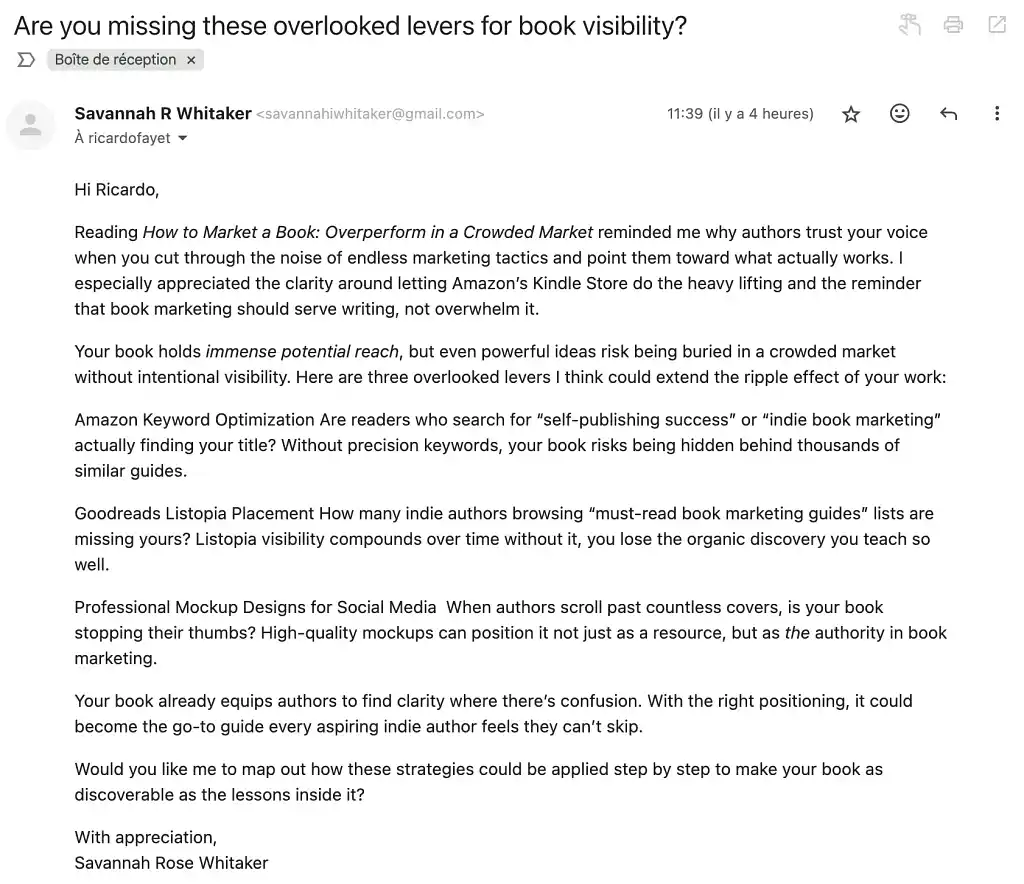
If you read something like this, it should set alarm bells off in your head. There are three major problems with people who try to flatter authors in this way:
- They have almost certainly not read your book, so they have no idea whether it has what it takes to achieve wide acclaim.
- The marketing strategies they suggest are often unachievable or sound a lot better than they really are. For example, a predatory company might offer to display your book at a well-renowned book fair for a fee — only to pile it with countless other books on a table in some unseen corner. Or, they might pay a screenwriter to turn your book into a Netflix pilot which never gets picked up.
- The label “bestseller” hardly means anything these days. It’s dead easy to become an Amazon #1 Best Seller through nefarious means, such as choosing a very niche category and buying several copies of your own book. Brent Underwood managed to get the coveted badge after just 5 minutes and $3 — and his book didn’t even have any content! If you really want to claim this meaningless accolade, at least play the system yourself rather than overpay someone else to do it. And know that the status doesn’t equate to sales or fans at all.
Here are a few of the many companies that offer untrustworthy “marketing packages”:
- Leavitt Peak Press: offers to republish your old book for a lower price and 100% royalties, then charges publishing and marketing fees
- Next Phaze Media Group: charges upfront fees to represent your book for potential movie deals (which never emerge)
- Book Publishers Ink: claims to be interested in purchasing 2,000 copies of your unpublished book
Of course, new scams pop up every day, so you’ll have to do your due diligence before paying for marketing services. Stay away from any company or individual that:
- has extensive bad reviews;
- has no testimonials or reviews at all;
- features books on their website which you cannot find elsewhere;
- cannot provide verifiable evidence of previous marketing success; or
- contacts you out of the blue with generic praise for your book.
You should also research other providers of the same services to see whether you have been quoted a competitive price. Find out how much various marketing services typically cost here.
Q: What aspects of book marketing should authors focus on learning and handling themselves to save money while promoting their work?
Suggested answer
Marketing a children’s book doesn’t have to require a huge budget. Being selective with where you are focusing your efforts, time, and budget will help maximize your return on investment. This can be getting testimonials from an author's own network, mazimizing your discoverability on Amazon through precise categories and keywords, and targeting special interest group for endorsements or bulk buys. For instance, if a picture book is about aviation, contacting aviation museums, organizations, and stores would be a great start. For kids books, reaching educators and librarians is important for word of mouth and for in-person event opportunities. Positive feedback from a teacher or librarians gives a book credibility and validation and lets families know this book is vetted, so to speak, and worth purchasing.
Tara is available to hire on Reedsy ⏺
5. Fake writing contests
The final publishing scam to avoid is dodgy writing contests. While legitimate competitions are a great way to reach an audience, solidify your writing credentials, and even make a little money in the form of prizes, beware of competitions that are little more than money-spinning enterprises. You can usually sniff them out by the fact that there are loads of winners and you have to pay to receive your prize.

You might have to cover the cost of a physical prize like a trophy. Or, your entry might be published in an anthology alongside all the other “winners” — but only if you pay an “editing fee” for the privilege.
In short, read the fine print. A small entry fee is fine, but any additional costs are a big red flag.
Here are some examples of writing contest scams:
- IACP Cookbook Awards: winners must buy a license to display an IACP Award seal for $500–1,000
- Global Ebook Awards: winners must pay $25 to receive their certificate
Always google a competition before entering. If it’s a legitimate contest, it will probably be listed on reputable websites. Plus, you should be able to find the details of any previous winners and the names of this year’s judges — if not, it’s probably not a contest worth entering.
To browse contests that have already been vetted, you can look through this directory of the best writing competitions.
Q: Do agents and publishers consider publications in literary magazines or awards from writing contests when evaluating an author?
Suggested answer
Yes, they absolutely do! One of my friends recently got a publishing offer for her picture book from a relatively informal online contest. So, it happens! Contests with a large online community aspect also help writers connect with each other, and this is so important for a writer in the long term.
Short story publications in prestigious magazines are an important part of how writers in the literary genre build their careers. This also goes for publications in magazines or newspapers that carry prestige in any genre. The New York Times' Modern Love column has launched a couple memoirs. I would say, though, that these magazines are struggling to survive amid the noise of the internet.
For non-fiction and memoir writers, getting published in outlets that are relevant to your target audience can help build your "platform"--your authority on a topic, and how big of an audience you can tap into. You can often take chapters or excerpts of your book and send them out as essays to various publications. Even if an agent or publisher doesn't see these articles, listing those publishing credits in your proposal will help prove your authority on the topic.
Tracy is available to hire on Reedsy ⏺
We hope this guide has helped you protect yourself on your publishing journey. Stay safe, avoid scammers, and we know you’ll find the right professionals for your book soon enough!

